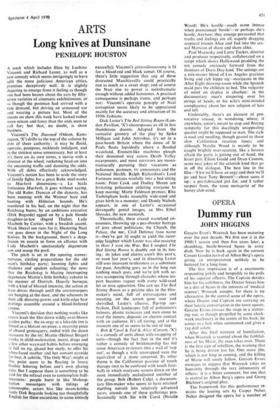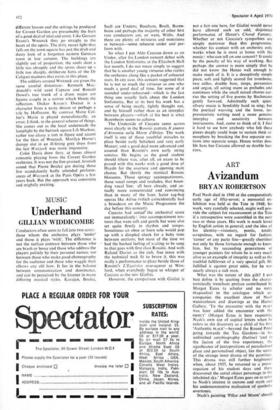OPERA
Dummy run
JOHN HIGGINS
Geraint Evan's Wozzeck has been maturing over the past decade. We first saw it in the 1960/1 season and then five years later, a shambling, beetle-browed figure in army drab. Now he is back again in the current Covent Garden revival of Alban Berg's opera giving an interpretation unlikely to be bettered for a long time.
The first impression is of a marionette responding jerkily and lumpishly to the pulls of his superior officers. The Captain derides him for his oafishness, the Doctor forces him to a diet of beans in the interests of 'medical science'; Wozzeck accepts, for there is no alternative. In the central scene of the opera, where Doctor and Captain are carrying on their lunatic conversation in the town square, Geraint Evans crosses the stage in a stutter- ing run, as though propelled by some clock- work machinery in the centre of his back; he comes to a halt when summoned and gives a rag doll salute.
After this final moment of humiliation, when Wozzeck is taunted about the faithful- ness of his Marie, the man takes over. There is the first sign of rebellion, the warning that he is being driven too far. One more jibe, which is not long in coming, and the killing of Marie will surely follow. Geraint Evans manages to suggest that Wozzeck takes on humanity through the very inhumanity of others: it is a bitter comment, but one that is central to Alban Berg's opera and Georg Bilchner's original play.
The framework for this performance re- mains the louring sets by Casper Neher. Neher designed the opera for a number of different houses and the settings he produced for Covent Garden are presumably the fruit of a good deal of trial and error. Like Geraint Evans's Wozzeck they go straight to the heart of the opera. The dirty russet light that falls on the town square has just the drab and dusty look of a forgotten eastern German town in late autumn. The buildings are slightly out of proportion, the roofs slant a little too abruptly and the spires shoot up a little too sharply, deliberate hints of the Dr Caligari madness that exists in this place.
The soldiers around Wozzeck are given the same careful distortion: Kenneth Mac-- donald's wild eyed Captain and Ronald Dowd's tree trunk of a drum major are figures caught in a mirror which bloats the reflection. Otakar Kraus's Doctor is a character from a nasty dream or perhaps a tale by Hoffmann. By contrast Marie Col- lier's Marie is played naturalistically, an error, I think, in the general scheme of things. She comes out as the local underneath the lamplight by the barrack square Lili Marlene, rather too classy a tart in figure and accent for the likes of Wozzeck. Marilyn Horne's dumpy slut in an ill-fitting grey dress from the last Wozzeck was more impressive.
Colin Davis drew fiery, at times almost romantic playing from the Covent Garden orchestra. It was not the fine grained. feverish sound that Pierre Boulez got during those few scandalously badly attended perform- ances of Wozzeck at the Paris Opera a few years back. But the approach was consistent and mightily exciting.



































 Previous page
Previous page